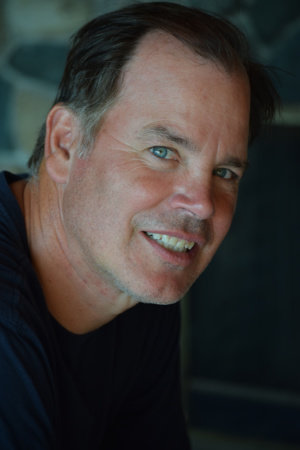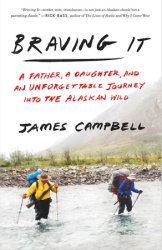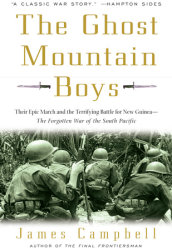When it comes to Alaska and literature, nature always wins. Be they fictional like John Thornton in Jack London’s Call of the Wild or real like Christopher McCandless in Jon Krakauer’s Into the Wild, tragic heroes are no match for the forbidding terrain of America’s largest, sparsest, scariest state. Writer James Campbell knows it well. In the early 2000s, he followed his explorer’s heart and lived off-and-on with his homesteading mountain man cousin Heimo Korth, hunting, trapping, and fishing in the Arctic National Wildlife Refuge, 250 miles from the closest anything. Campbell’s book The Final Frontiersman tells of his time as far from “civilization” as humans can be, including the heartbreaking story of how Heimo and wife Edna, a Yupik Eskimo, carry on after losing their two-year-old daughter Coleen in a river accident. They never even recovered her body.
Campbell, fifty-four, regaled his daughter Aidan with tales of Alaska, promising to take her to The Last Frontier when she got older. They went three times. The story of their amazing father-daughter nature expeditions is told in Campbell’s Braving It, an incredible mix of memoir, adventure, outdoors, and horror. The first two trips, when Aidan was fifteen, took place in 2013. Their maiden summer voyage was to help Heimo build a cabin. The second, during winter, was to enjoy Thanksgiving on planet Hoth. The last journey — equal parts thrilling/harrowing/exhausting/astounding — was a month-long backpacking trip that required hauling a canoe to the headwaters of the Hulahula River, where they survived the rapids that delivered them to the Arctic Ocean. The trek was completed where the continent stops, literally at “land’s end.”
The serious dangers James and Aidan faced were myriad: Grizzly bears, -50 degree nights, dad’s heart problem, and frigid water that induced hypothermic conditions. Less dangerous, but equally fraught for many a city-slicker, was the constant human stink, having to catch dinner, and doing one’s bathroom business in a “honey bucket.” Fair to say, it’s easy to imagine readers of Braving It being split among those who admire Campbell’s parenting and those who think his children should become wards of the state. Count Aidan among his biggest believers.
PENGUIN RANDOM HOUSE:Were you an adventurous kid, dreaming of far off places?
JAMES CAMPBELL: I was. I’ve always sought out wilderness. I grew up in Wisconsin and we took family trips to Glacier National Park, hiking in the Bob Marshall Wilderness. When I turned eighteen, I had notions of going off to Alaska and homesteading like Heimo. I ended up at an Ivy League school, which wasn’t great training for a mountain man. After that, I got caught up on the professional track in Chicago and New York City. I ended up in grad school at UC-Boulder, living in a cabin up in the mountains without any running water, which reaffirmed my passion for the outdoors. Besides Alaska, my other favorite place in the world is New Guinea. I’ve been there a bunch. I did a trek in 2006 across the Papuan Peninsula retracing a 150-mile World War II route. I’ve always been interested in the wilds.
PRH:How did your career as an outdoors writer evolve?
JA: In the late ’80s, I was reading Outside, Sports Afield, and National Geographic, of course. I figured out people were getting paid to do what they love and kind of make money at it. I started pitching magazines, doing little weekend wilderness getaway pieces for Backpacker. They’d pay me $50, which wasn’t even enough for gas money, but one thing led to another. I’d started out in advertising, but I bailed to become an intern at Rolling Stone. I left a job that paid pretty well, because I always wanted to be a writer, and a legitimate explorer. I didn’t go quite that far, but I was able to marry two interests.
PRH:At what point did you decide your Alaska trips with Aidan could be turned into a book?
JA: The trips and the book idea coincided. Initially, we were just going to do a month long backpacking trip. Aidan had been asking for years, since I’d written The Final Frontiersman in 2004. She was a little girl then, and the only one who would listen to my Alaska stories over and over, so I promised her we’d go someday. She held me to it. I’d considered it as a book, but first I had to see if Alaska was a place Aidan would enjoy. At the start of our first trip, she was miserable. Here’s a fifteen-year-old girl peeling poles, and cutting, limbing, and bucking trees before dragging them out of the woods to construct a cabin. There were clouds of mosquitoes, Aidan was terrified of grizzly bears, and she missed home while we worked our butts off. Many times I thought ‘what have I done?’
But after a week or two, Aidan rallied and grew more comfortable. She was the one who pushed to go back the second time, which is when I realized there was really something there, that it had the makings of what became Braving It.
PRH:Once it became a book project, I’m guessing you didn’t mind that you “had to” spend more time in Alaska?
JA: I’d been to Alaska since The Final Frontiersman was published, but not for long. Writing it was such a realization of my youthful dream to be a homesteader that I just fell hard for the place. I’ve been scheming to spend a good chunk of time there ever since. My daughter made that happen.
PRH:As someone who grew up in Montana, I’ve experienced freezing subzero temperatures, but I can’t quite fathom an Alaskan winter where it lasts for weeks on end. Was Aidan prepared for it?
JA: No, not really. Wisconsin gets cold, so I think physically she was ready, but she wasn’t psychologically prepared for Alaska. I wasn’t either the first time I went up in winter. When I arrived it was -40 below, which is shocking. Plus, there’s no light. The sun goes down end of November and doesn’t come up until late January. It’s not total darkness, there’s an ambient light. It’s a pre-dawn kind of feel. My favorite description is the the great Scottish word, “gloaming,” but again, it was hard for her the first week. Our tent had a little wood stove and we’d sleep through the embers of the night, so one of us would get up to light the fire. It was bitterly cold, but Alaska is so exotic and different in the winter, it might be my favorite time of the year. I think it might be Aidan’s as well.
PRH:There are some personal things in Braving It that your average teenage girl wouldn’t want announced to her classmates. Did you have to do father-daughter negotiating about what was fair game for the book?
JA: At first, there might have been things she wanted to stay in Alaska. We were dirty, bug-bitten, and could never take a shower. She had to wash up in a glacier-fed river that was so cold you could only stand in it for a few seconds to bathe. In some ways, Aidan is a very normal teenager, in some ways she isn’t. At some point, she just decided “what the hell, it’s all part of the experience.” She started a blog, Gritty Gal, and wrote a bunch of essays about her time in the wilderness. It included one called “The Bathroom Ritual,” which she knew her classmates would read, so she got over whatever fear of embarrassment she had.
PRH:Aidan also got over her fear of bears, an animal that for many people represents something more terrifying beyond its gigantic self…
JA: Good point. The grizzly bear embodies everything that’s dangerous about being in the woods. Like a lot of people, Aidan thought there was a grizzly in every thicket ready to jump out and maul her.
PRH:On the last trip in particular, there were a number of death-defying moments — you falling out of the canoe and almost losing Aidan, a polar bear coming close enough to break out the rifles — did you ever think you’d gone too far while in the thick of it?
JA: My burden of responsibility was enormous. I was criticized for doing what I did, which I expected. A woman in an Amazon review said she wanted to smack me for putting Aidan in danger. But everyone has different realities and thresholds, and my wife and I have always raised our daughters to not be afraid to do things like we did in Alaska. I haven’t treated my three girls any differently than if they’d been boys. Sure, there were times when I felt ‘holy shit, I’ve made a terrible mistake!’ Any time you put yourself, or a family member, in a perilous situation, you wonder if it was the right decision. But what’s the alternative? Never leaving your couch? That doesn’t appeal to me or my daughter.
PRH:A word you use in the book which I like is “catastrophizing.” Can you explain what it means and how it affects modern life?
JA: Up until recently, kids were raised differently. We were kicked out the door in the morning and told not to come back until dinner. I think back on it and I’m kind of amazed I’m still here. I can’t believe we survived some of the stunts we pulled. But today, we’ve become a too risk-averse society. We’re so fearful, and we overestimate the control we have over life. The key to going into the wilderness is to prepare for the worst and hope things go okay. It’ll never be the best, but if you think about all the negatives, the dangerous things that could happen, you wouldn’t do it. I’m glad there’s a push to get children back outside, the whole Free-Range Kids movement. I think nature is necessary.
PRH:As a child of the 1970s-80s when parenting was dialed way back, let me play devil’s advocate here and point out that a lot of troublesome stuff goes on in the woods…
JA: The lack of supervision pendulum can swing too far in the other direction, where we over-exaggerate the noble myth of the great outdoors. There have been things I wouldn’t let my daughters do because it was too dangerous. We were hiking in the Sawtooth Mountains in Idaho and came upon a lake, all of them wanted to jump off this huge cliff into the water. It didn’t look safe to me and if I was too afraid then I wasn’t going to let them jump. But I still believe we’ve gone too far and are too overly protective of kids.
PRH:There’s a deeply human moment in Braving It when you explain that the loss of Coleen was the reason Heimo and Edna never left their Alaskan isolation, that her spirit kept them there. How big a specter did her death cast on your trips with Aidan?
JA: When we were up there on the river where Coleen died, it was impossible not to think about how it affected my cousin and his wife in profound ways. I remembered the story on all the trips, and I apologize for the crude phrase, but it upped the ante. Heimo is unquestionably one of the greatest modern wilderness men left on Earth. He made a mistake and lost his daughter because of it. I’ve spent a lot of time in the wilderness, but I don’t have anywhere near his skills. I was fearful sometimes. Am I being unnecessarily stupid?
After Coleen died, there were a lot of people who suggested, encouraged, or even demanded Heimo and Edna leave. How could they stay? And to them, it was a feeling of how could we not stay? So much of this land reminds them of their daughter.
PRH:Another word you introduced in the book is the great German term fernweh. Can you describe what it is and how you deal with it?
JA: It’s a longing for a place, or multiple places, or in my case, the wilderness. It’s an intense feeling you get to experience a place you love. It’s more than wanting to get out on the road, or having itchy feet. It goes beyond wanderlust. It’s psychological and has physical manifestations. I’ve always had fernweh. It hard because I consider myself a grounded person, a family man, rooted in Wisconsin, but I have these competing desires and inclinations. Fernweh is real.
PRH:Where have you never ventured that holds appeal?
JA: (Laughs) Oh, there’s so, so many. There’s a tribe in Western New Guinea, the Korowai who live in 100-foot high tree-houses. They’re some of the last hunter-gatherer people on the planet. I desperately want to go there and see them firsthand. I’ve also always wanted to go to Greenland, Iceland, Siberia, float down the Amazon, bike Scotland…should I keep going? Too bad we only have one life.
PRH:Clearly, you’re not drawn to places that are well-traveled.
JA: Don’t get me wrong, going to Paris or Barcelona to sit in sidewalk cafes with my wife drinking wine or beer would be great. I love those trips as well, but the experiences that appeal to me the most have an element of discomfort, of pushing yourself.
PRH:Besides the great adventure stories, what do you think Aidan can take from the trips as she heads off to college and beyond into adulthood?
JA: There’s a couple of basic things. We’ve always gotten along, but some of the best relationships you’ll ever have are forged out of adversity. There were certainly times when our relationship was tested — times when Aidan wanted to be in Alaska with anyone but me — but overall, our bond was strengthened by our time up there together. She understands what it means. I also think she realized there’s something to be learned by getting outside of your comfort zone. The one-on-one relationship with nature is disappearing, which takes away an elemental human experience.
I helped create a monster. After our trips, I had to spend time reminding Aidan to enjoy her present everyday life in Wisconsin. She has fernweh like her Dad. Instead of going off to college this fall, she’s taking a gap year. For two months, Aidan’s heading to Spain to get fully fluent in Spanish, then she’s going to Costa Rica and backpacking her way down to Patagonia. There’s both pain in saying good-bye, and great joy. The trips she’s taking sum up everything I hoped she’d get out of our time in Alaska.
PRH:What did your wife Elizabeth, back home in Wisconsin with your other two daughters, think of the Alaska trips?
JA: There were certainly times when she was less than overjoyed about what was happening, but she’s also spent a lot of time in the mountains. Right after we got married, we sold everything and backpacked through Southeast Asia for as long as the money held out. She contracted malaria in New Guinea, had a 105-degree temperature in the middle of nowhere. As sick as I’ve ever seen somebody. Elizabeth knows better than anyone the potential dangers, so naturally, she had misgivings, but she got beyond them knowing the rewards.
PRH: Are Rachel and Willa clamoring for trips of their own with Dad?
JA: Yep. I need to stay healthy. At different times, I’m definitely going to have to take both of them somewhere. Both of them are like Aidan in that they would enjoy an eating tour in Europe, but they prefer something remote and unique. My next oldest, Rachel, is already holding my feet to the fire. She wants to go to New Guinea.
PRH:I thought the sparing moments of introspection and reflection in Braving It worked, less being more made them that much stronger. Let’s end on a lovely passage that stuck with me, even though my daughter is only five, when Aidan was recounting favorite childhood moments to you.
“If ever there is a moment in a father’s life when his heart feels as if it will burst with joy and gratitude, this was it: when his child is talking about her life with such fondness.”
JA: It was one of my favorite moments on our trips to Alaska. Ten years from now, if your daughter is reminiscing about something you did, telling you and your wife how much she loved it, with more than just excitement, that she has a personal connection to her own experiences…it’s deep. And enough to make a father melt.













